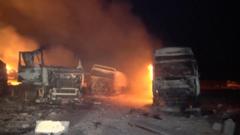Iran's supreme leader, Ayatollah Ali Khamenei, has recently indicated a willingness to engage in nuclear negotiations with the United States, following intense pressure from key government officials. High-ranking members of the Iranian government, including President Raisi and other influential political leaders, met with Khamenei last month while discussing the impact of continuing sanctions and a failing economy.
Iran Shifts Stance on Nuclear Talks Amidst Domestic and International Pressures

Iran Shifts Stance on Nuclear Talks Amidst Domestic and International Pressures
Iran's Supreme Leader previously opposed negotiations with the U.S. but now considers them essential due to escalating internal economic crises and external threats.
Historically, Khamenei has dismissed the idea of talks with the U.S. as imprudent. However, senior officials made a compelling case for a shift in policy, emphasizing that without direct engagement with Washington, the Islamic Republic could face devastating consequences. They underscored the interconnected threats of worsening economic conditions—including a plummeting currency and severe shortages of essential resources—and the looming danger of military action from both the U.S. and Israel targeting Iran’s critical nuclear sites.
The officials warned that failure to negotiate might provoke military strikes against pivotal nuclear facilities such as Natanz and Fordow. Such an escalation could lead to Iran's retaliation, potentially igniting a broader conflict that would further destabilize the nation and lead to widespread domestic unrest, including protests and labor strikes against the government. They posited that military conflicts on multiple fronts would pose an existential peril to the regime's authority.
As a result, following this urgent discourse, Khamenei has reportedly authorized indirect discussions with the U.S., with hopes for direct negotiations should preliminary talks yield positive outcomes.
The officials warned that failure to negotiate might provoke military strikes against pivotal nuclear facilities such as Natanz and Fordow. Such an escalation could lead to Iran's retaliation, potentially igniting a broader conflict that would further destabilize the nation and lead to widespread domestic unrest, including protests and labor strikes against the government. They posited that military conflicts on multiple fronts would pose an existential peril to the regime's authority.
As a result, following this urgent discourse, Khamenei has reportedly authorized indirect discussions with the U.S., with hopes for direct negotiations should preliminary talks yield positive outcomes.





















